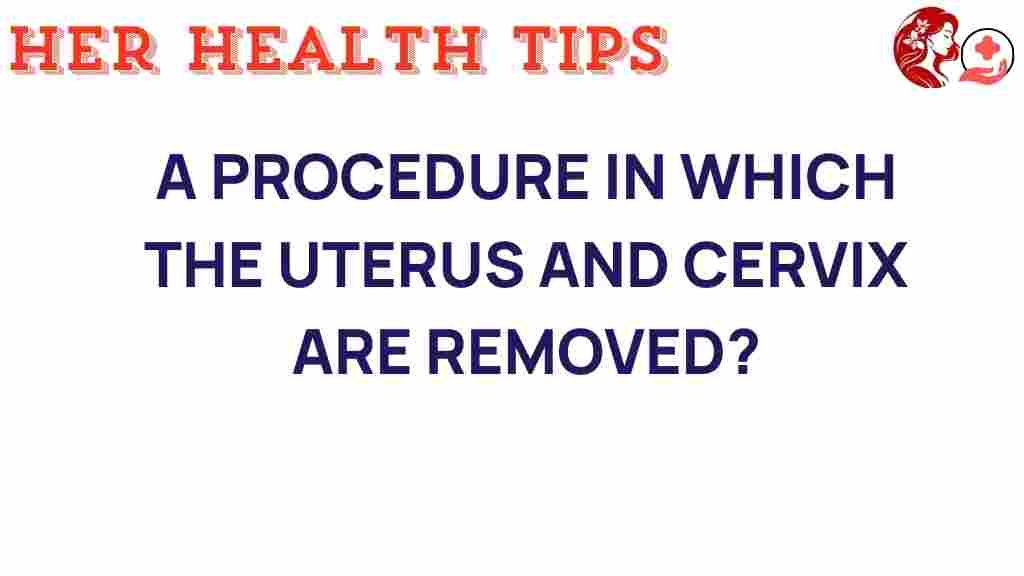Unveiling Hysterectomy: What You Need to Know About This Major Surgery
Hysterectomy is a significant surgical procedure that involves the removal of the uterus. This operation is often considered when there are serious concerns regarding women’s health, such as persistent pain, heavy bleeding, or other gynecological conditions. Understanding the intricacies of hysterectomy, including its benefits, risks, and recovery process, is essential for anyone facing this major surgery.
Understanding Hysterectomy
A hysterectomy is a surgical procedure that removes the uterus, and sometimes other reproductive organs, depending on the specific medical situation. This can include the cervix, ovaries, and fallopian tubes. There are various reasons a healthcare provider might recommend a hysterectomy, including:
- Uterine fibroids
- Endometriosis
- Uterine prolapse
- Abnormal bleeding
- Cancer of the uterus, cervix, or ovaries
Hysterectomy can be a life-changing decision, and understanding the surgical procedure is the first step toward making an informed choice.
Types of Hysterectomy
There are several types of hysterectomy, each tailored to the patient’s specific conditions:
- Total Hysterectomy: Removal of the uterus and cervix.
- Partial (Subtotal) Hysterectomy: Removal of the uterus while leaving the cervix intact.
- Radical Hysterectomy: Removal of the uterus, cervix, surrounding tissues, and possibly the ovaries and fallopian tubes, often performed in cases of cancer.
Each type of hysterectomy has its implications for recovery and long-term health, which will be discussed further in this article.
Preparing for a Hysterectomy
Preparation for a hysterectomy involves several steps:
- Consultation with a gynecologist to discuss symptoms and medical history.
- Tests such as ultrasounds, biopsies, or MRIs to assess the condition of the uterus and surrounding areas.
- Discussion of the type of anesthesia that will be used.
- Arranging for post-surgery care and support, as recovery can take time.
It is crucial to have a clear understanding of the procedure and what to expect during recovery.
The Surgical Procedure
During a hysterectomy, the patient is typically placed under general anesthesia. The procedure can be performed in several ways:
- Abdominal Hysterectomy: An incision is made in the abdomen to remove the uterus.
- Vaginal Hysterectomy: The uterus is removed through the vagina, often resulting in less pain and faster recovery.
- Laparoscopic Hysterectomy: Minimally invasive surgery using small incisions and a camera. This method often leads to quicker recovery times.
The choice of method depends on several factors, including the patient’s overall health, the size of the uterus, and the reason for the surgery.
Benefits of Hysterectomy
There are numerous benefits associated with hysterectomy, particularly for women suffering from debilitating symptoms. These benefits include:
- Relief from chronic pain associated with conditions like endometriosis.
- Reduction or elimination of heavy menstrual bleeding.
- Improved quality of life after the removal of problematic fibroids or other issues.
- Lower risk of certain cancers, depending on the procedural choices made.
These benefits can significantly enhance a woman’s health and well-being.
Risks and Considerations
While hysterectomy can provide relief from various health issues, it is not without risks. Some potential risks include:
- Infection at the surgical site.
- Bleeding or blood clots.
- Damage to surrounding organs, such as the bladder or intestines.
- Hormonal changes if the ovaries are removed, which can lead to menopause.
- Emotional effects, including feelings of loss or changes in body image.
It is vital to discuss these risks with a healthcare provider to make an informed decision about surgery.
Recovery After Hysterectomy
The recovery process varies depending on the type of hysterectomy performed and the individual’s overall health. Here are some general recovery guidelines:
- Hospital Stay: Most patients stay in the hospital for 1-2 days after surgery, though this can vary.
- Rest: It is crucial to rest for several weeks, especially after an abdominal hysterectomy.
- Pain Management: Pain relief will be necessary, and medications will be prescribed to manage discomfort.
- Activity Restrictions: Avoid heavy lifting and strenuous activities for at least 6-8 weeks.
- Follow-Up Appointments: Regular check-ups with the gynecologist will be important to monitor recovery.
Adhering to recovery guidelines can help ensure a smoother healing process.
Emotional and Psychological Considerations
Undergoing a hysterectomy can have emotional and psychological impacts. It is common for women to experience a range of feelings, from relief to anxiety. Here are some tips for coping:
- Talk openly with your healthcare provider about any emotional concerns.
- Join support groups or forums where you can share experiences with others who have undergone similar surgeries.
- Consider speaking with a therapist if feelings of depression or anxiety persist.
Addressing these feelings is as important as focusing on physical recovery.
Long-Term Effects of Hysterectomy
While many women report significant improvements in their quality of life post-hysterectomy, there are long-term considerations to keep in mind:
- Menopause: If the ovaries are removed, women will enter menopause immediately.
- Changes in Sexual Function: Some women may experience changes in libido or sexual enjoyment.
- Hormone Replacement Therapy: Discuss the possibility of HRT with your doctor if the ovaries are removed.
Understanding these long-term effects can help women prepare for life after surgery.
Conclusion
Hysterectomy, or uterus removal, is a significant surgical procedure that can greatly impact a woman’s health and quality of life. With various types and methods available, it is essential to weigh the benefits against the risks carefully. Proper preparation and understanding of the recovery process are crucial for a successful outcome.
If you are considering a hysterectomy or want to learn more about cervical health and women’s health issues, consult your gynecologist for personalized advice. For more detailed information, you can visit ACOG’s Hysterectomy FAQ to gain further insights into this important surgical procedure.
Taking charge of your health is empowering, and being informed about procedures like hysterectomy is a vital step in that journey.
This article is in the category Reproductive and created by HerHealthTips Team
